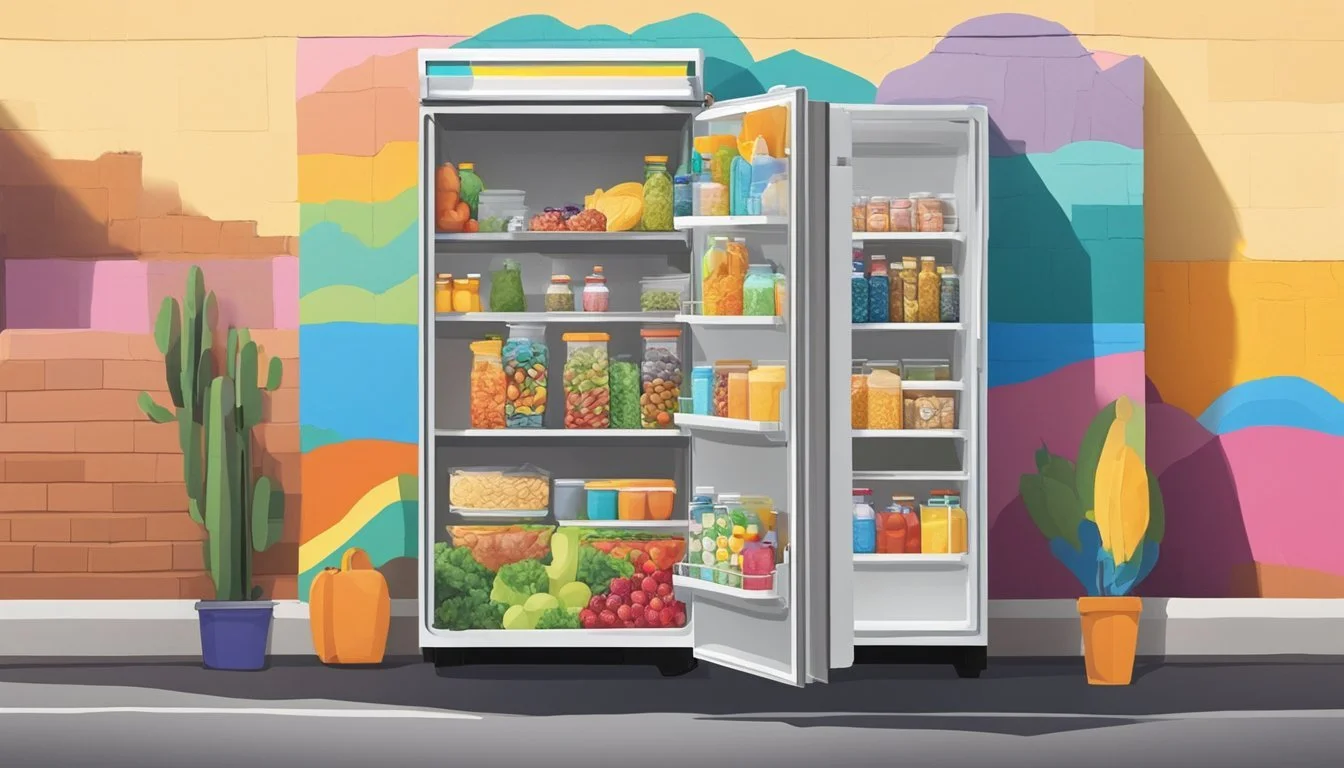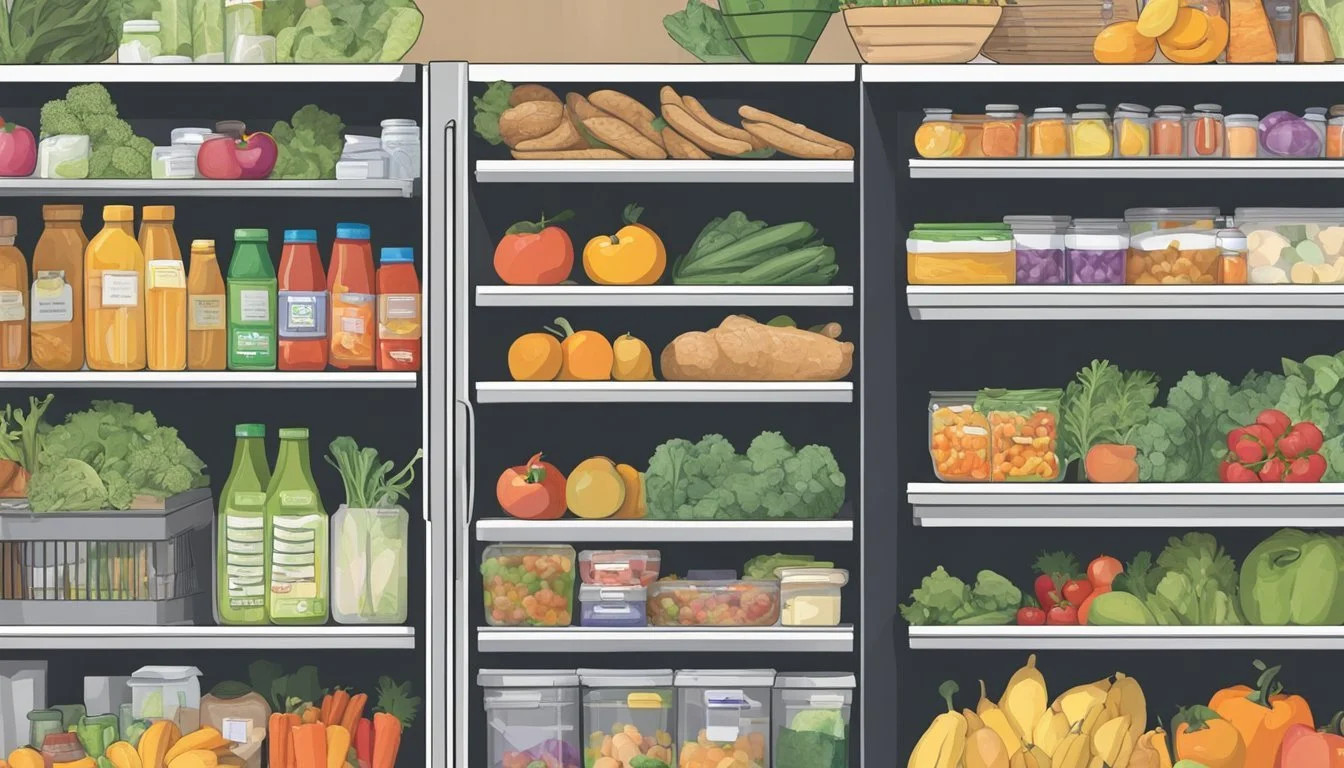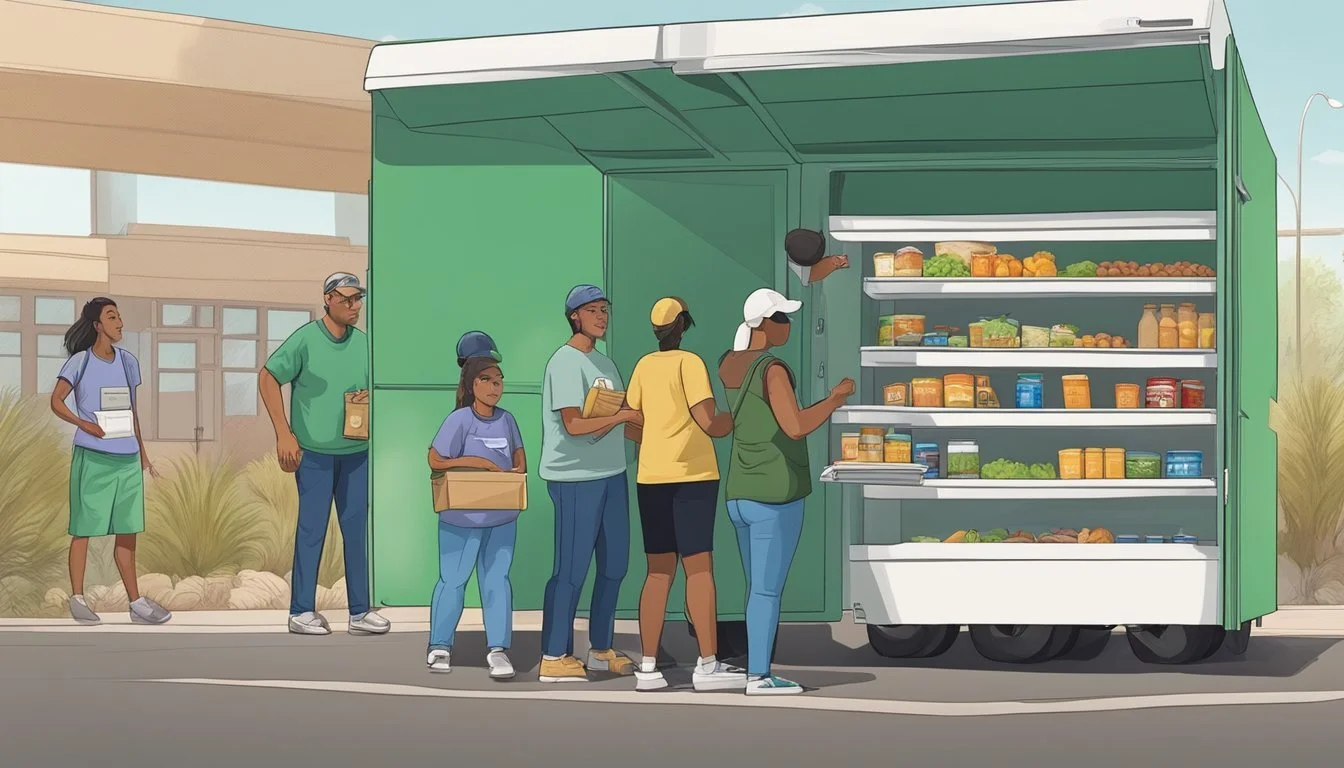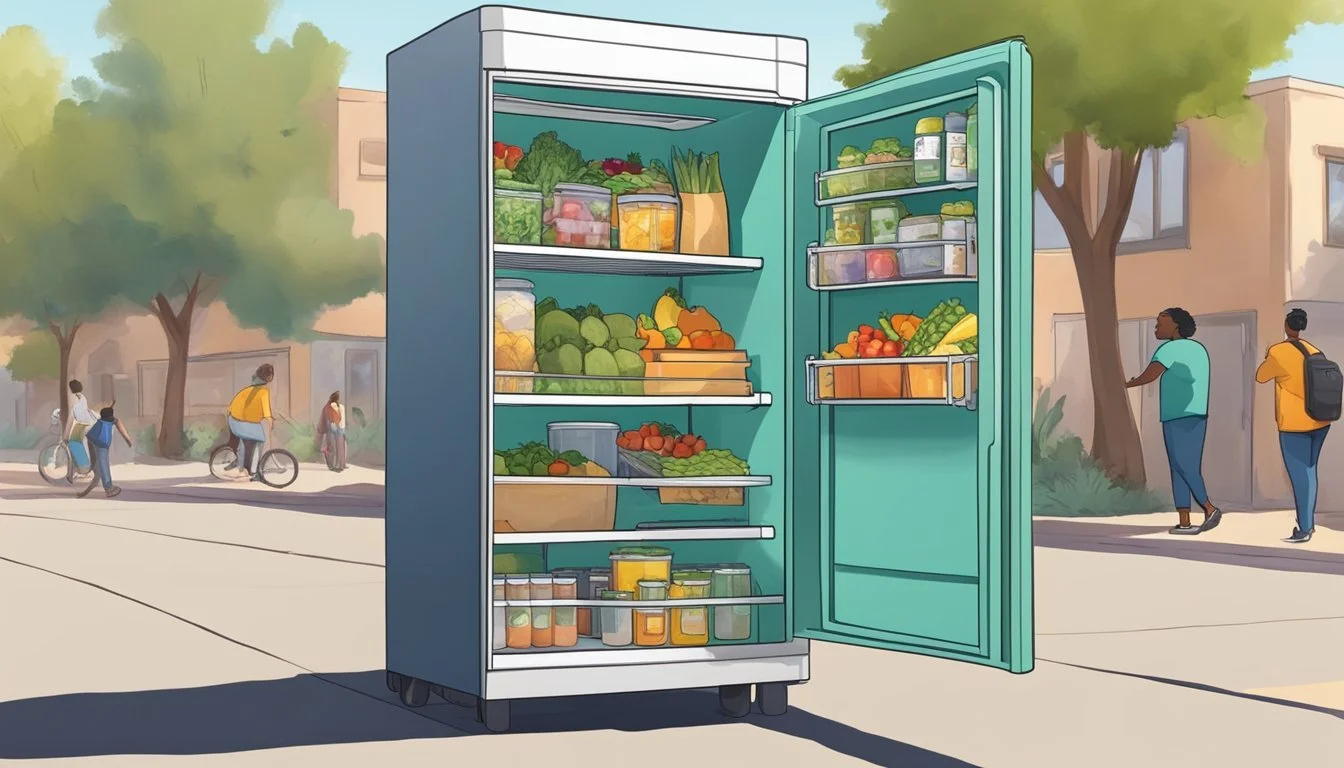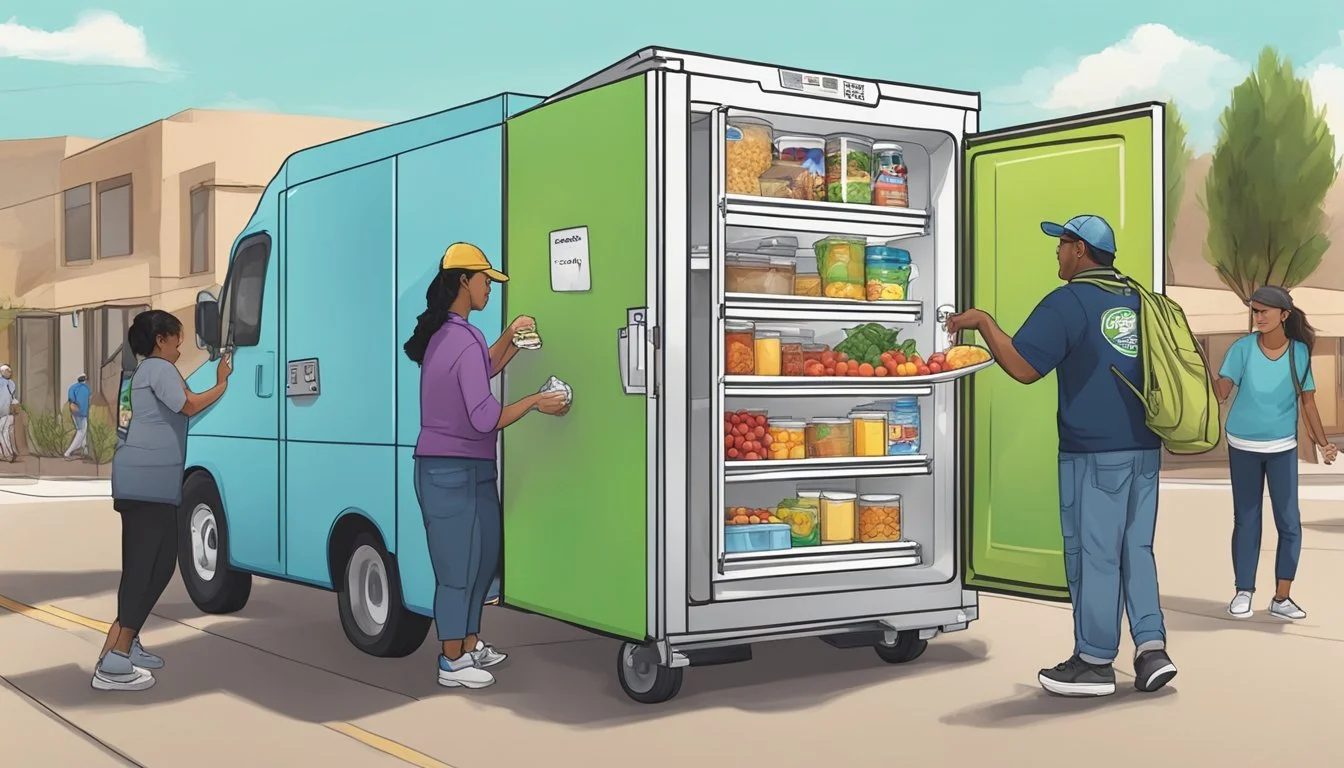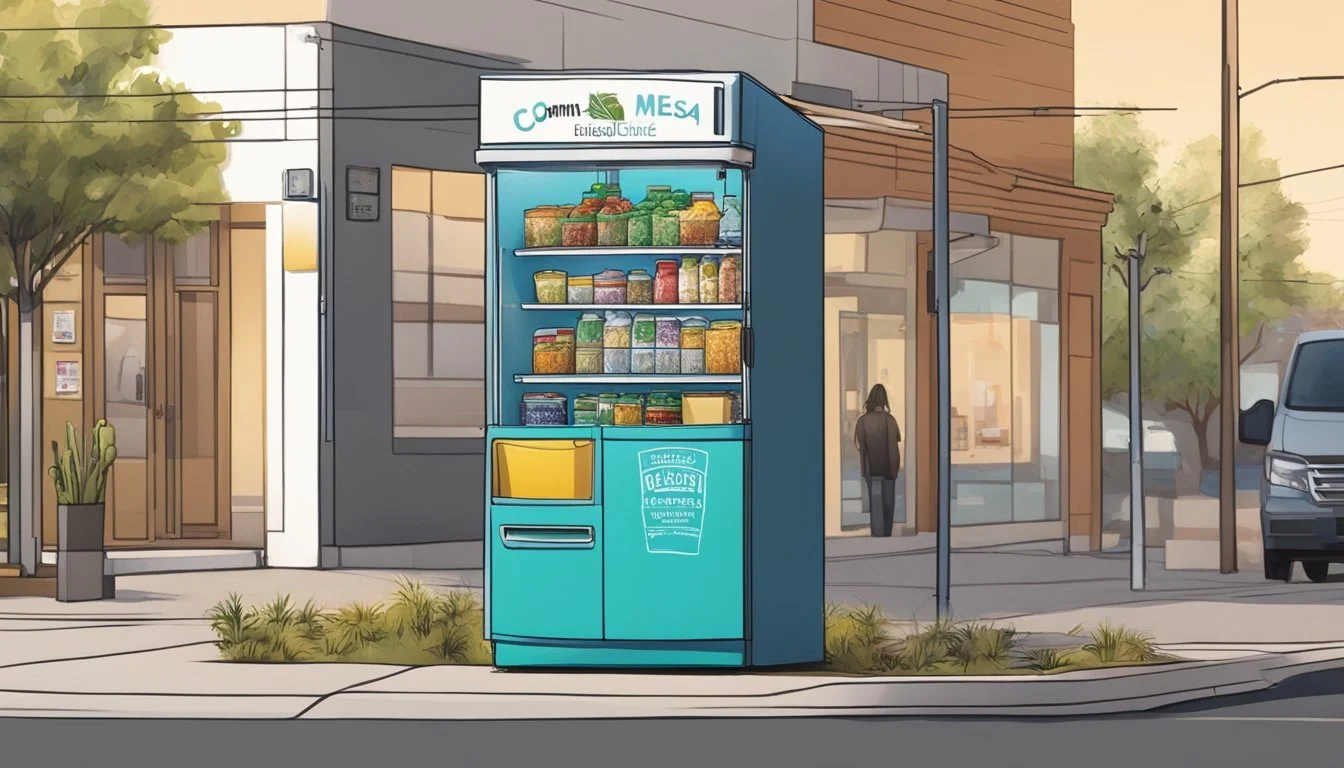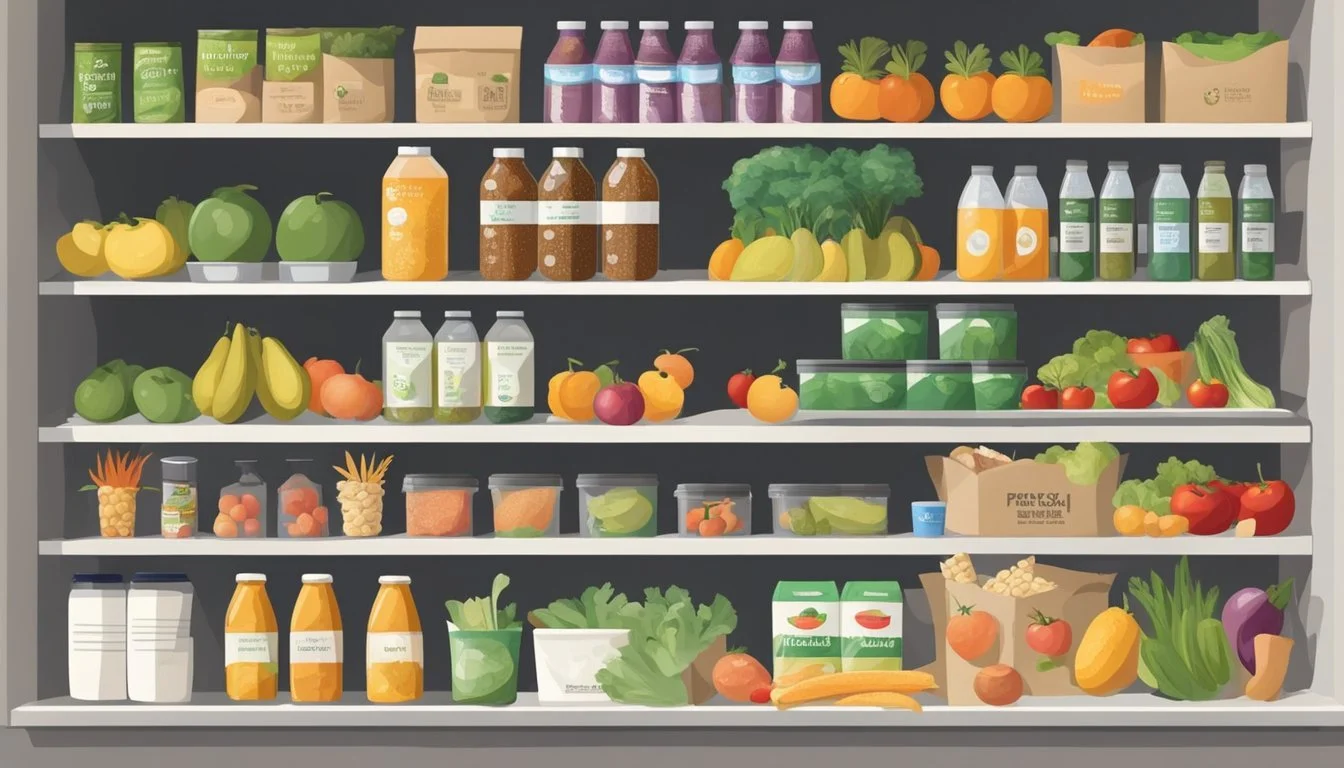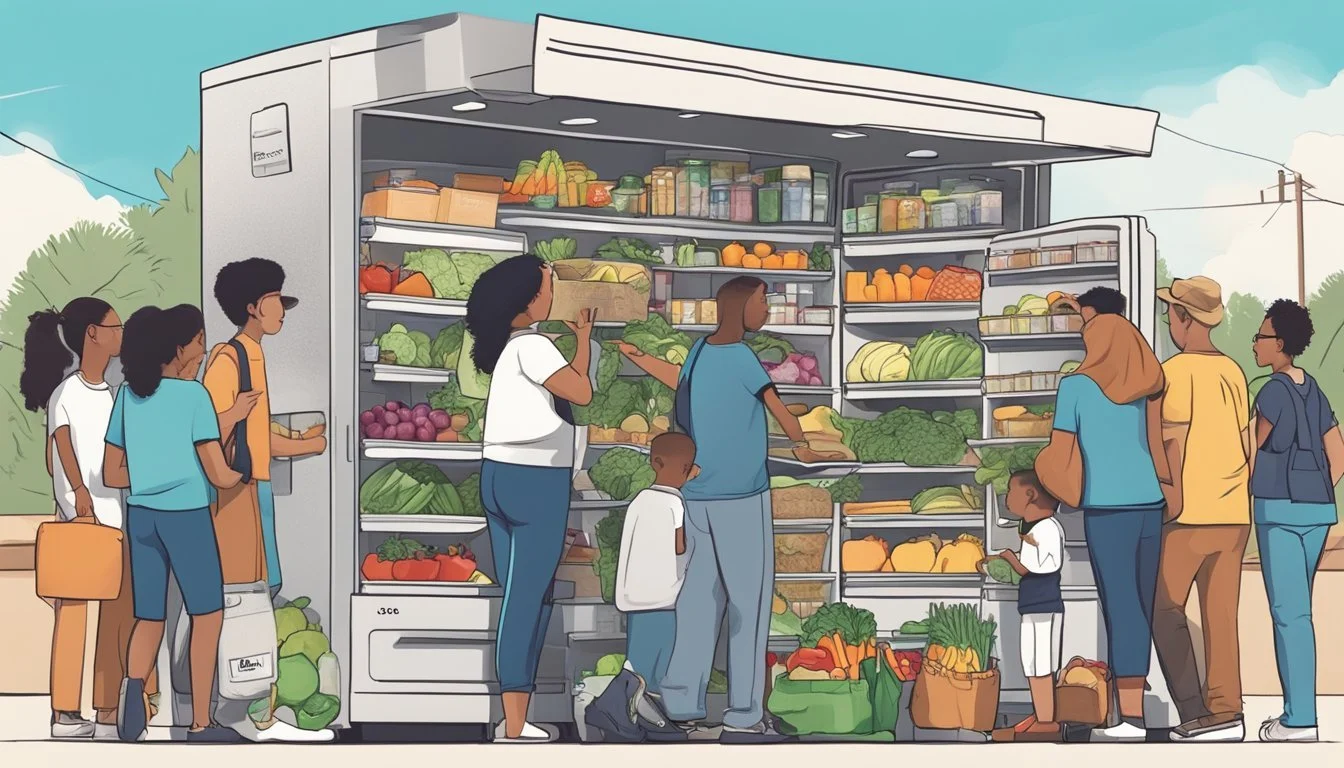Mesa, AZ Community Fridge
A Hub for Nourishing Connections
In the vibrant city of Mesa, Arizona, a sustainable initiative is taking root that addresses both food insecurity and food waste. The Community Fridge initiative is a grassroots effort aimed at providing residents with access to free food while also creating an opportunity to reduce waste. By establishing communal refrigerators in the area, businesses and individuals who have surplus food can contribute, ensuring that perfectly good food reaches those who need it instead of heading to the landfill.
The Mesa Community Fridge is more than just a hub for food sharing; it's a symbol of community collaboration and support. With volunteers at the helm, the initiative not only helps in cutting down food waste but also fosters stronger community ties by bringing people together. Individuals from all walks of life can both contribute to and benefit from the fridge, thus promoting an inclusive environment centered around mutual aid and resource sharing.
Strategically located in downtown Mesa, the Community Fridge operates under a simple yet effective principle: Take what you need, leave what you can. It's a straightforward approach that has resonated with the community, encouraging a shared sense of responsibility and care among local residents. The success of the project is evident in its growing popularity, as it provides a practical solution to an ongoing challenge while reinforcing the integral value of community engagement.
History and Purpose of Community Fridges
Community Fridges, or solidarity fridges and honesty fridges as they are sometimes called, originated as a response to food waste and food insecurity. Found in various countries including Spain, Germany, the UK, Ireland, and the U.S., these refrigerators are installed in public spaces, allowing people to share food and reduce waste.
Spain is often credited with starting this movement, with the initiative expanding across Europe to countries like Germany and the UK. Each fridge operates on a simple guiding principle: "Take what you need, leave what you don't." This system relies on community honesty and support to function.
Community fridges have a dual purpose:
To reduce waste: They offer a place for people to donate surplus food, diverting it from landfills.
To aid food insecurity: They provide access to food for those who need it, no questions asked.
In the U.S., the community fridge concept saw a surge during the COVID-19 pandemic, as many faced heightened food insecurity. Fueled by community groups and volunteers, fridges in cities like Mesa, AZ serve as a testament to neighborhood solidarity and a collective effort to combat hunger and sustainability.
By offering a decentralized approach to food accessibility, community fridges operate under the assumption that access to food is a right, not a privilege, supporting the notion that community care can be practical and impactful.
Mesa's Community Fridge Initiative
In Mesa, Arizona, the concept of community fridges has taken a solid root with the introduction of a public refrigerator that serves to bridge the gap between food abundance and scarcity. Situated in downtown Mesa, the project operates on a simple yet powerful premise—those with excess food can leave it for those in need.
Local businesses and residents contribute to the communal fridge, enhancing food security and fostering a sense of community spirit. The presence of this fridge helps to alleviate hunger while simultaneously reducing food waste—an issue of increasing concern in urban areas.
The initiative not only shares surplus food but also aims to strengthen the fabric of the local community. By encouraging donations, it supports a network of people who are both givers and receivers, thus promoting social solidarity.
Benefits of Community Fridge - Increases access to nutritious food - Reduces waste through redistribution of food - Saves money for people in need - Builds stronger community bonds
The Mesa Community Fridge is an innovative approach to address food insecurity, a model that other cities are observing and adopting into their own community fridge networks. It's more than just a food pantry; it's a public charity committed to creating sustainable practices for food sharing.
Through this project, Mesa is nurturing a community-led solution to combat hunger and enhance social welfare within its diverse population, making it a commendable aspect of the city's approach to community development and social engagement.
The Role of Local Businesses and Groups
Local businesses and groups in Mesa, Arizona, play a crucial part in the operation and success of the Community Fridge by providing consistent food donations and volunteer support.
Business Participation
Local businesses are essential contributors to Mesa’s Community Fridge program. They help maintain the fridge's inventory by donating excess food, ensuring that quality items do not go to waste. Food donations come from a diverse range of businesses, including supermarkets, restaurants, and local farms. This collective effort not only addresses food insecurity but also fosters a sense of communal responsibility and sustainability.
Participating Businesses:
Supermarkets
Restaurants
Bakeries
Catering Services
Business roles include:
Donating surplus food: Ensures the fridge is stocked with a variety of nutritious options.
Sharing resources: Amplifies the reach and efficiency of the program through collaboration.
Group Involvement
Groups within the community encompass volunteers and nonprofit organizations who are instrumental in the day-to-day operations of the Community Fridge. They engage in activities such as collecting food from local business donors, maintaining the cleanliness of the fridge, and monitoring its usage to abide by health and safety standards.
Volunteer Tasks:
Collection of food: Coordination with local businesses to gather and deliver food donations.
Fridge cleaning and monitoring: Regular maintenance to ensure food safety and hygiene.
Groups involved include:
Volunteer teams
Community service organizations
Nonprofit partners
Group contributions include:
Strengthening community bonds through shared efforts.
Promoting inclusive participation and ensuring the project’s impact reaches all segments of the population.
Addressing Food Insecurity in Mesa
Mesa, Arizona, has undertaken several initiatives to combat food insecurity within its communities. Among these, the implementation of community fridges stands out as an innovative way to provide access to free food for those in need. These community fridges, also known as freedges, operate on the principle of sharing surplus food, preventing waste while addressing hunger.
Volunteers are essential in this process, as they collaborate with restaurants, grocery stores, and other food-providing establishments to collect unsold items. Food placement in fridges is managed carefully, ensuring that items are fresh, properly labeled, and meet health standards. By doing so, Mesa supports not only individuals facing hunger but also contributes to a larger, more sustainable food system.
In addition to community fridges, Mesa has allocated substantial federal funding to tackle food insecurity over the next few years. This demonstrates a long-term commitment to supporting vulnerable populations, including communities of color, which often face disproportionate challenges in accessing nutritious food.
Moreover, local organizations like The Salvation Army in Mesa offer meal programs that go beyond simply offering food. They provide a space for valuable social interaction, cater to those who might not have the means to travel to food distribution centers, and offer holistic support through case management.
Efforts in Mesa Description Community Fridges (Freedges) Share surplus food to alleviate hunger, stocked by volunteers Federal Funding Allocations $5 million dedicated to food security initiatives Organizational Meal Programs Nutritious meals served, with added social benefits
Garden Pool, a local nonprofit, could also play a role in addressing food scarcity by implementing sustainable agriculture practices and encouraging the growth of community gardens. This would enhance local self-reliance and provide a steady source of nutrition.
Through these combined efforts, Mesa is actively pursuing a range of solutions to reduce food insecurity among its residents. The city's approach reflects a practical understanding of the complexities surrounding hunger and the need for multifaceted responses.
Operation and Maintenance
The Mesa Community Fridge program focuses on ensuring that all appliances meet rigorous health and safety standards while maintaining an environmentally conscious approach to appliance maintenance and recycling.
Health and Safety Standards
For the Mesa, AZ Community Fridge initiative, adhering to strict health and safety protocols is paramount. Refrigerators and additional appliances such as washers and dryers are routinely inspected to comply with local health codes. A critical component of these standards includes:
Regular Sanitization: All Community Fridge appliances undergo frequent cleaning to prevent foodborne illnesses.
Temperature Control: Refrigerators are monitored to maintain temperatures that halt the growth of harmful bacteria.
Appliance Maintenance and Recycling
Maintaining the appliances involves a series of steps to guarantee they perform efficiently. For the residents and businesses of Mesa who are part of the Community Fridge network, this includes:
Routine Inspection: A systematic review for signs of wear or malfunction.
Performance Testing: Ensuring appliances like refrigerators efficiently cool and dryers properly heat.
Part Replacement: Utilizing manufacturer-approved components for repairs.
Professional Servicing: Leveraging specialists for maintenance when required.
User Education: Providing a 5-step guide to users for basic on-site care of the appliances.
For appliances that are beyond repair, appliance recycling is encouraged. Mesa solid waste customers may place an online request for the collection of bulky appliances, subject to a trip charge fee. This program supports the community's efforts to reduce landfill waste by properly dismantling and recycling appliance components.
Community Engagement and Support
In Mesa, Arizona, the Community Fridge initiative is a testament to local commitment and support, facilitating food sharing and reducing waste through community involvement and events aimed at mutual aid.
Volunteering
The success of the Mesa Community Fridge is largely due to the dedicated volunteers who contribute their time and efforts. They are responsible for a range of activities that ensure the fridge operates smoothly. These include:
Food Sorting and Management: Volunteers help to organize and maintain the food within the fridge, ensuring that the shared resources are fresh and safe for consumption.
Community Outreach: They play a crucial role in educating the local community on how to participate in the program and the importance of reducing food waste, especially in times of a pandemic or community crises.
Events and Fundraising
Events and fundraising activities are central to the sustainability of the Mesa Community Fridge. Such initiatives are designed not only to support the fridge financially but also to strengthen bonds within the local community. Key events include:
Community Celebrations: These events serve to inform and involve the local community, celebrating the spirit of mutual aid and shared responsibility.
Fundraising Campaigns: Regular fundraising efforts are undertaken to ensure the fridge is well-stocked and operational, rallying community support and emphasizing the importance of the project.
Through volunteering, events, and fundraising, the Mesa Community Fridge exemplifies how community engagement can lead to a robust support system providing mutual aid, especially in challenging times.
Accessibility and Location of Fridges
Mesa, Arizona, now boasts various community fridges that provide a valuable resource to residents, ensuring accessible public spaces that offer free food to those in need. These communal fridges are strategically located and are easy to find.
Locations:
CPLC Community Fridge: Situated at 325 N Stapley Dr, Mesa, AZ 85203, this fridge is centrally located and can be used by individuals and local businesses to share surplus food.
Eagle Pathway Community Fridge: Another key location in Mesa, AZ, part of a wider community effort to reduce food waste and provide for those in need.
Access: Community fridges in Mesa are often located in public spaces, like community centers or alongside local businesses, making them highly accessible. They are designed to be utilized by anyone without any form of discrimination, aligning with the ethos of Phoenix's growing community fridge movement.
Operation Hours: These fridges are usually available 24/7, although specific operating times might vary and should be checked on-site. They rely on the generosity and trust of the community, with the simple rule of "take what you need, leave what you can."
Support Network: A supportive network surrounds these fridges, including local organizations and volunteers that maintain and stock the fridges, ensuring they remain a sustainable community asset.
The presence of community fridges in Mesa aligns with the broader Phoenix area's response to food insecurity, demonstrating a grassroots effort to provide mutual aid and strengthen ties within the local community.
How to Contribute to the Mesa Community Fridge
Contributions to the Mesa Community Fridge are crucial for its success in reducing food waste and helping community members in need. They can be made through donating food items or providing monetary support and appliances necessary for its operation.
Donating Food Items
Individuals and businesses can contribute food items to the Mesa Community Fridge. Preferred items include:
Eggs
Bread
Meat (must be kept in the freezer)
Food should be within its use-by date and in good condition. Volunteers assist in ensuring that food is safe for consumption and monitor the fridge's contents.
Guidelines for Food Donations:
Check use-by dates: Items must be within their consumption period.
Condition: Food must be unopened and undamaged.
Packaging: Loose produce should be clean and ideally brought in reusable containers.
Storage: Meat should be immediately placed in the designated freezer to maintain safety.
Monetary and Appliance Donations
In addition to food, the community fridge accepts monetary donations and appliances that aid in its operation. Financial contributions go towards maintenance, while donated appliances, such as freezers, are vital for storage.
Guidelines for Monetary and Appliance Donations:
Finances: Accepted through official channels associated with the Mesa Community Fridge.
Appliances: Must be in working order. Specifically, freezers are always needed to store perishable goods.
Legal Considerations
When launching a community fridge in Mesa, AZ, it's crucial to understand the local regulations that govern food donation and distribution. Complying with these laws can ensure that the fridge operates smoothly without legal complications.
Local Laws and Regulations
Mesa's local laws may differ from other cities and states regarding food safety and distribution. Community fridge organizers in Mesa should verify compliance with the following:
Food Safety Standards: They must adhere to Arizona’s food safety guidelines, which include maintaining certain temperatures for perishable items to prevent foodborne illnesses.
Donation Liability: Under the Good Samaritan Food Donation Act, donors are generally protected from liability, provided they donate in good faith and the food has not been knowingly tampered with.
Zoning and Land-use: The placement of the fridge must comply with Mesa’s local zoning laws, which might dictate where public refrigeration units can be located.
Health Department Regulations: Although community fridges operate on a grassroots level, they should engage with the local health department to ensure all necessary guidelines are met.
The community fridge network can serve as a resource, providing guidance based on experiences from established fridges in areas with similar laws. By staying informed about local legislation and health and safety codes, Mesa's community fridge can be a reliable food source for those in need while remaining within legal parameters.
Public Awareness and Educational Efforts
Community refrigerators in Mesa, Arizona, are not just about food distribution—they represent a dynamic shift in community support and waste reduction. They operate on an honor system which ensures that everyone has access to nutritious food while also mitigating food waste.
Promoting the Concept
The idea behind community fridges is straightforward: they provide a space where people can leave surplus food and those in need can take what they require with no questions asked. To foster public awareness and support for this initiative, informational campaigns and partnerships with local businesses are essential. They help inform the public about the location of fridges and the types of donations accepted. Educational materials also stress the impact of these fridges on food insecurity and waste reduction.
5 Step Guide to Starting a Fridge
To encourage the spread of community fridges, a 5 step guide can be indispensable for those interested in starting one:
Secure a Location: Find a publicly accessible and safe location that can house the fridge and ensure it's easy to clean and maintain.
Get the Fridge: Acquire a refrigerator either by donation or purchase and establish a power source for it.
Establish Guidelines: Create clear protocols regarding what food can be donated to avoid spoilage and ensure safety. Clearly communicate how the honor system operates.
Promote the Fridge: Use social media, local news, and community bulletins to raise awareness. Include translators for communities with language barriers.
Maintain and Monitor: Appoint community members or organizations to oversee the fridge's cleanliness and supply, making sure it serves its purpose effectively.
The guide is not only a blueprint for establishing new fridges but also serves as an educational tool that articulates the role of community fridges in reducing waste and feeding those in need.
Mesa Community Fridge Impact Assessment
The Mesa Community Fridge initiative serves as a pivotal resource addressing hunger and food waste in Mesa, Arizona. Placed in accessible public spaces, these fridges offer a solution where surplus perishable foods are shared, benefiting local community members who may experience food insecurity.
Hunger Mitigation
Individual Impact: Community fridges provide immediate relief to individuals and families by offering direct access to no-cost nourishment.
Community Engagement: The initiative encourages local involvement by accepting donations from residents, fostering a collective effort to mitigate hunger.
Food Waste Reduction
Diverting Surplus: Surplus food, which might otherwise be discarded, finds a second life, feeding those in need.
Resource Optimization: Through redistribution, the potential environmental impact of waste is transformed into a community benefit.
Community Contribution
Residents with excess food from their gardens are invited to donate, aligning ecological practices with humanitarian aid.
Businesses are also engaged to support the fridges, creating a bridge between commerce and community service.
The Mesa Community Fridge operates on trust, with no stringent regulations on who can take or give, which promotes an inclusive atmosphere. This system not only aligns with sustainability goals but also cultivates local social connections. The impact of such a program is multifaceted, tackling both economic and social issues hand in hand.

